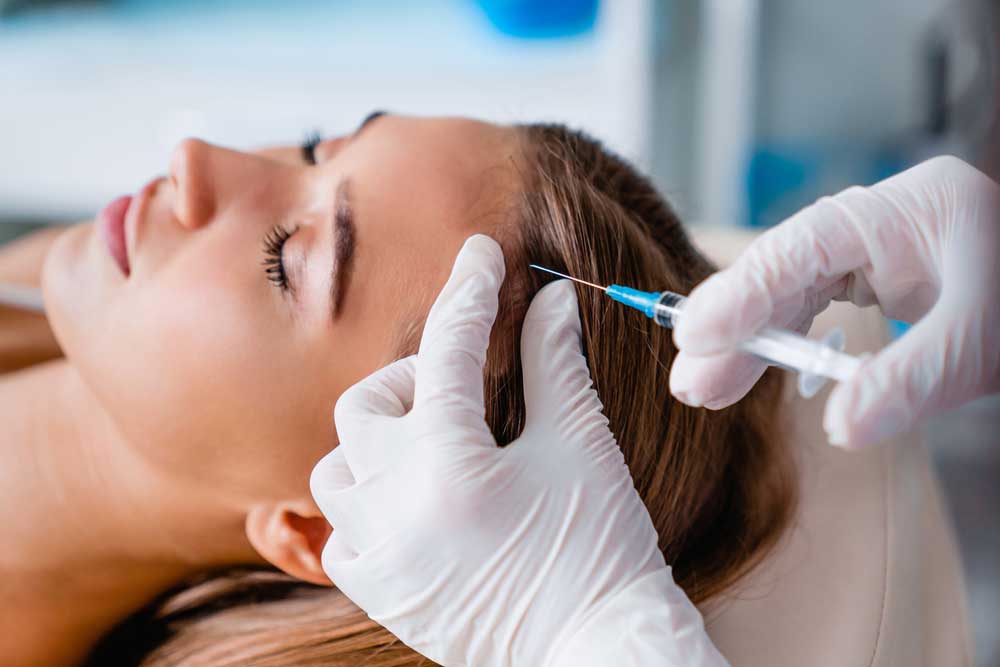Hair loss is natural, as everyone experiences it. As per the American Academy of Dermatologists, losing 50 to 100 strands of hair a day is normal. There are over 100,000 hair follicles on the head, so losing about 100 strands in a day may not be noticeable. As compared to men, women are likely to lose more hair strands each day. Studies also suggest that on average, 40% of women shed more hair than normal daily. This extra hair loss can be attributed to several reasons, including styling, stress, nutrition, diet and lifestyle choices, menopause, pregnancy, genes, etc. In men, about two-thirds experience hair loss and thinning by the age of 35.
If you have observed more hair fall than normal, you might be wondering if your hair is thinning or if you are going bald and whether your hair will grow back after thinning. Hair thinning and baldness will depend on factors such as the underlying cause of your hair loss and the area where you are experiencing hair loss/hair thinning.
Hereditary Hair Loss
Male/female pattern baldness is the most common type of hair loss. This condition is also referred to as androgenetic alopecia and occurs when hair follicles become incapable of growing new hair. Hereditary hair loss is typically irreversible and permanent and occurs due to a family history of baldness. In males, hair loss usually starts from the hairline, spreading to the back of the head. In females, the thinning mostly occurs on the crown of the head. While male pattern baldness eventually leads to baldness, female pattern baldness typically leads to hair thinning. Your dermatologist can examine your hair loss and suggest hair restoration options to combat hereditary hair loss.
Alopecia Areata
Alopecia areata causes the hair on the scalp to fall out in small patches. This condition tends to develop suddenly, within a matter of days. Although the cause for alopecia areata remains unknown, studies suggest that genetics and stress could be the main triggers. The majority of patients suffering from alopecia areata recover fully, without any treatment. So if you are suffering from alopecia areata, your hair will generally grow back.
Hormonal Imbalance
Hormonal changes during menopause and during or after pregnancy may cause women to experience hair loss. In men, hormonal fluctuations and imbalances can lead to hair loss. However, hair loss caused by a hormonal imbalance is usually temporary. For example, thyroid problems are known to cause hair loss.
Nutrient deficiencies
Studies have linked nutrient deficiencies to several hair loss conditions such as alopecia areata, female pattern hair loss, androgenetic alopecia, and chronic telogen effluvium. A deficiency of nutrients like iron, zinc, vitamin A, vitamin E, vitamin D, biotin, selenium, niacin, folic acids, and fatty acids is a well-known cause of hair thinning.
Hair loss and stress
Not many people realize that an individual’s stress level can impact hair growth. Too much stress can lead to hair loss and thinning in men and women. If you are experiencing more hair fall than normal, review your stress levels and work towards eliminating stress. Try out stress-relieving activities like spending time in nature, pursuing hobbies, meditation, and so on. Once your stress level normalizes, your hair is likely to grow back.
Changes in medication, dramatic weight loss, or a new hair product can also cause hair loss.
It is critical to understand what the underlying cause of your hair loss is. Your doctor will be able to determine the cause and recommend an effective treatment option accordingly. Depending on the cause, treatment options could range from prescription medication to diet changes to hair restoration procedures like PRP, FUE (Follicular Unit Extraction), or FUT (Follicular Unit Transplant).
Want to learn more about hair transplant in New Jersey? Get in touch with our expert surgeons today at the New Jersey Hair Restoration Center for the best hair restoration options.


